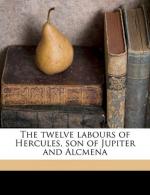|
This section contains 2,379 words (approx. 8 pages at 300 words per page) |

|
Jupiter is the largest planet in the solar system and is easily visible in the night sky. Jupiter's mass (1.9 × 1027kilograms [4.2 × 1027 pounds]) is nearly two and a half times the mass of the rest of the solar system's planets combined. Jupiter's volume, filled mostly with gas, is 1,316 times that of Earth. The fifth planet from the Sun, Jupiter's year is 11.86 Earth years but its day is short, only nine hours and fifty-five minutes. Jupiter resembles a small star: its composition, like the Sun's, is mostly hydrogen and helium. It emits about twice the energy that it receives from the Sun and puts out over 100 times more heat than Earth. If Jupiter had been about 50 to 100 times larger, it might have evolved into a star rather than a planet.
Historic Observations of Jupiter
Jupiter has intrigued humans since antiquity. It is named for the king of the Roman gods, and...
|
This section contains 2,379 words (approx. 8 pages at 300 words per page) |

|


